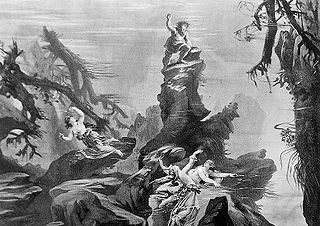
Der Ring des Nibelungen, WWV 86, is a cycle of four German-language epic music dramas composed by Richard Wagner. The works are based loosely on characters from Germanic heroic legend, namely Norse legendary sagas and the Nibelungenlied. The composer termed the cycle a "Bühnenfestspiel", structured in three days preceded by a Vorabend. It is often referred to as the Ring cycle, Wagner's Ring, or simply The Ring.
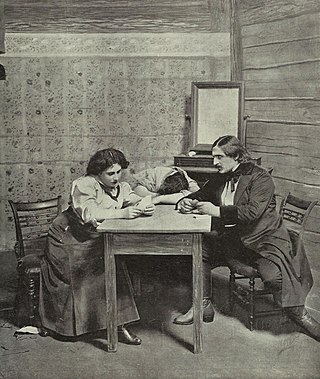
La fanciulla del West is an opera in three acts by Giacomo Puccini to an Italian libretto by Guelfo Civinini and Carlo Zangarini, based on the 1905 play The Girl of the Golden West by the American author David Belasco. Fanciulla followed Madama Butterfly, which was also based on a Belasco play. The opera has fewer of the show-stopping highlights that characterize Puccini's other works, but is admired for its impressive orchestration and for a score that is more melodically integrated than is typical of his previous work. Fanciulla displays influences from composers Claude Debussy and Richard Strauss, without being in any way imitative. Similarities between the libretto and the work of Richard Wagner have also been found though some attribute this more to the original plot of the play, and have asserted that the opera remains quintessentially Italian.
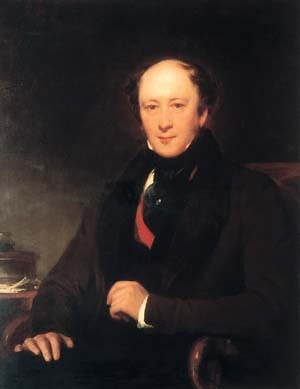
James Robinson Planché was a British dramatist, antiquary and officer of arms. Over a period of approximately 60 years he wrote, adapted, or collaborated on 176 plays in a wide range of genres including extravaganza, farce, comedy, burletta, melodrama and opera. Planché was responsible for introducing historically accurate costume into nineteenth century British theatre, and subsequently became an acknowledged expert on historical costume, publishing a number of works on the topic.
Armide is an opera by Christoph Willibald Gluck, set to a libretto by Philippe Quinault. Gluck's fifth production for the Parisian stage and the composer's own favourite among his works, it was first performed on 23 September 1777 by the Académie Royale de Musique in the second Salle du Palais-Royal in Paris.

La Gioconda is an opera in four acts by Amilcare Ponchielli set to an Italian libretto by Arrigo Boito, based on Angelo, Tyrant of Padua, a 1835 play in prose by Victor Hugo.
The Knot Garden is the third opera by composer Michael Tippett for which he wrote the original English libretto. The work had its first performance at the Royal Opera House, Covent Garden, on 2 December 1970 conducted by Sir Colin Davis and produced by Sir Peter Hall. There is a recording with the original cast.

Oberon, or The Elf-King's Oath is a 3-act romantic opera with spoken dialogue composed in 1825–26 by Carl Maria von Weber. The only English opera ever set by Weber, the libretto by James Robinson Planché was based on the German poem Oberon by Christoph Martin Wieland, which itself was based on the epic romance Huon de Bordeaux, a French medieval tale. It was premiered in London on 12 April 1826.
Mary Zimmerman is an American theatre and opera director and playwright from Nebraska. She is an ensemble member of the Lookingglass Theatre Company, the Manilow Resident Director at the Goodman Theatre in Chicago, Illinois, and also serves as the Jaharis Family Foundation Professor of Performance Studies at Northwestern University.

Don Carlos is a (historical) tragedy in five acts by Friedrich Schiller; it was written between 1783 and 1787 and first produced in Hamburg in 1787.

The Eve of Saint Venus is a story or, as author Anthony Burgess put it, an "opusculum", on the theme of marriage. Originally conceived as a play in three acts in 1952, it was re-written as a novella after the author initially failed to find a theatre willing to stage the play. The novella was first published in 1964. The play version of the work premiered in 1979.
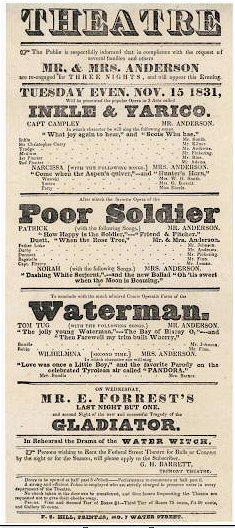
Inkle and Yarico is a comic opera first staged in London, England, in August 1787, with music by Samuel Arnold and a libretto by George Colman the Younger.
John Retallack is a British playwright and director.
Greek is an opera in two acts composed by Mark-Anthony Turnage to a libretto adapted by Turnage and Jonathan Moore from Steven Berkoff's 1980 verse play Greek. The play and the opera are a re-telling of Sophocles's Greek tragedy Oedipus Rex with the setting changed to the East End of London in the 1980s. The opera was first performed on 17 June 1988 in the Carl-Orff-Saal of the Gasteig, Munich, in a co-production by the Munich Biennale, the Edinburgh International Festival and the BBC.
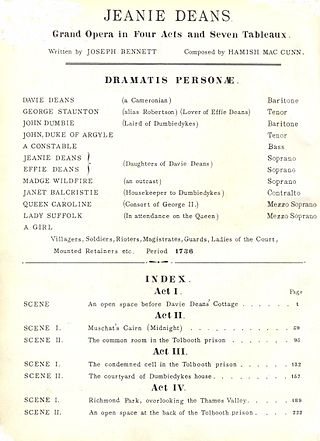
Jeanie Deans is an opera in four acts by Hamish MacCunn (1868–1916) set to a libretto by Joseph Bennett which is loosely based on Walter Scott's 1818 novel, The Heart of Midlothian and is named after its heroine, Jeanie Deans. The opera was commissioned by the Carl Rosa Opera Company and first produced at the Royal Lyceum Theatre in Edinburgh on 15 November 1894 to great acclaim.

Peter Ebert was a German opera director. Son of noted German director Carl Ebert who left Nazi Germany in 1934 with his son and moved to England, he was best known for his work with Glyndebourne Opera and the Scottish Opera where he staged over 50 productions from 1963 to 1980 and which brought him great success.

Scottish opera is a subgenre of Scottish music. This article deals with three separate, but overlapping subjects:

Esmeralda is an opera in four acts composed by Arthur Goring Thomas to an English-language libretto by Theo Marzials and Alberto Randegger based on Victor Hugo's 1831 novel The Hunchback of Notre-Dame. It premiered in London on 26 March 1883 at the Theatre Royal, Drury Lane with Georgina Burns in the title role and Barton McGuckin as her lover, Phoebus.

Mary, Queen of Scots is an opera in three acts composed by Thea Musgrave. Musgrave also wrote the libretto based on Peruvian writer Amalia Elguera's play Moray. It focuses on events in the life of Mary, Queen of Scots, from her return to Scotland in 1561 until 1568 when she was forced to flee to England. The opera premiered on 6 September 1977 at the King's Theatre in Edinburgh performed by Scottish Opera. It has subsequently had multiple performances in the UK, US, and Germany. A chamber version, produced by Musgrave in 2016, also exists.
Graham Eatough is an English theatre director and playwright, based in Scotland. He was a founding member of theatre company Suspect Culture.












